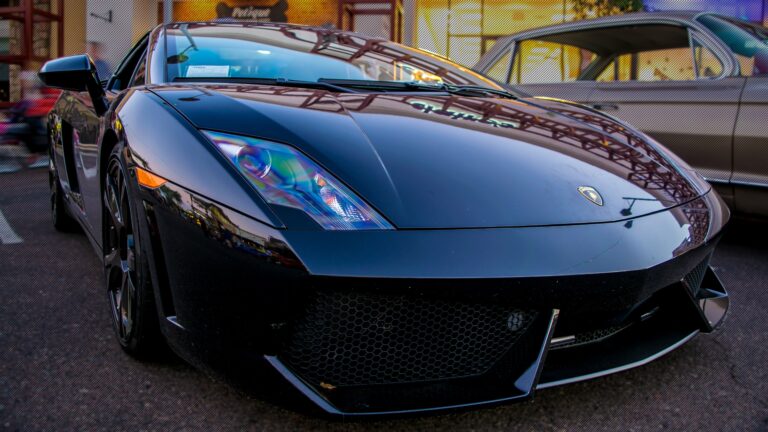Exotic Car Brands: A Comprehensive Guide to Automotive Opulence and Performance
Exotic Car Brands: A Comprehensive Guide to Automotive Opulence and Performance cars.truckstrend.com
The world of automobiles is vast and varied, ranging from humble daily commuters to specialized off-road beasts. Yet, soaring above the practical and the mundane lies a realm of unparalleled luxury, breathtaking performance, and exquisite craftsmanship: the domain of exotic car brands. These are not merely cars; they are rolling sculptures, technological marvels, and symbols of ultimate aspiration, pushing the boundaries of what’s possible on four wheels.
An exotic car brand distinguishes itself through a combination of extreme performance, cutting-edge design, rarity, and an astronomical price tag. They are built for passion, not just utility, representing the pinnacle of automotive engineering and artistic expression. For enthusiasts, they embody dreams of speed, luxury, and exclusivity. For the automotive industry, they serve as laboratories for future technologies and design trends, showcasing innovations that eventually trickle down to more accessible vehicles. Understanding exotic car brands means appreciating the relentless pursuit of perfection, where every detail, from the roar of the engine to the stitching on the leather, is meticulously crafted.
Exotic Car Brands: A Comprehensive Guide to Automotive Opulence and Performance
Defining Exclusivity: What Makes a Car "Exotic"?
What precisely elevates a vehicle from a high-performance sports car to an "exotic" masterpiece? Several key attributes converge to create this rare breed of automobile:
- Extreme Performance: Exotic cars boast engines that produce immense horsepower and torque, leading to blistering acceleration times (often 0-60 mph in under 3 seconds) and top speeds that far exceed legal limits. This performance is not just about raw power but also sophisticated handling, advanced aerodynamics, and high-performance braking systems designed to harness that power effectively.
- Avant-Garde Design: Forget conventional aesthetics. Exotic cars are characterized by their bold, often radical designs that prioritize aerodynamics and visual drama. Sweeping lines, aggressive air intakes, low-slung profiles, and intricate details are hallmarks, making them instantly recognizable and often breathtaking to behold. They are designed to stand out, not blend in.
- Rarity and Exclusivity: Unlike mass-produced vehicles, exotic cars are often built in limited numbers, sometimes just a few dozen units globally. This scarcity, combined with their hand-built nature and bespoke customization options, ensures exclusivity. Owning one is a privilege reserved for a select few.
- Astronomical Price Point: The cost of an exotic car can range from a quarter-million dollars to several million, placing them far beyond the reach of the average consumer. This price reflects the extensive research and development, rare materials, meticulous craftsmanship, and brand prestige involved in their creation.
- Uncompromising Luxury and Craftsmanship: While performance is paramount, the interiors of exotic cars are equally lavish. Premium materials like carbon fiber, fine leather, Alcantara, and exotic woods are standard. Every element, from the ergonomic seating to the custom-designed switchgear, reflects an obsessive attention to detail and a commitment to bespoke luxury.
- Technological Innovation: Exotic car brands are at the forefront of automotive technology, integrating advanced materials (like aerospace-grade carbon fiber), sophisticated electronic systems, active aerodynamics, hybrid powertrains, and cutting-edge infotainment. They are often pioneers of technologies that later become industry standards.
- Brand Heritage and Prestige: Many exotic car brands have rich histories steeped in racing success, legendary designs, and iconic figures. This heritage contributes significantly to their allure and prestige, imbuing each vehicle with a story and a legacy.

The Pantheon of Power: Iconic Exotic Car Brands
The world of exotic cars is dominated by a select group of manufacturers, each with its unique philosophy and distinctive offerings.

-
Ferrari: Perhaps the most iconic exotic car brand, Ferrari, founded by Enzo Ferrari in 1939, embodies passion, speed, and Italian flair. Known for its Rosso Corsa (racing red) color, a prancing horse emblem, and a legendary racing pedigree (Formula 1), Ferrari produces V8 and V12-powered machines that are as much works of art as they are performance vehicles. Models like the 250 GTO, F40, Enzo, LaFerrari, and the modern 296 GTB and SF90 Stradale define automotive dreams.

Lamborghini: Born from a rivalry between Ferruccio Lamborghini and Enzo Ferrari, Lamborghini stands out with its audacious, angular designs and raw, unadulterated power. Often named after famous fighting bulls, their cars are known for their dramatic presence and spine-tingling V10 and V12 engines. The Miura, Countach, Diablo, Murciélago, Gallardo, Huracán, and the Aventador’s successor, the Revuelto, represent a no-compromise approach to exoticism.
-
McLaren: With a deep-rooted heritage in Formula 1 racing, McLaren Automotive is synonymous with lightweight construction, cutting-edge aerodynamics, and a relentless focus on driver engagement. Utilizing carbon fiber chassis extensively, their cars offer unparalleled precision and performance. Iconic models include the McLaren F1 (once the world’s fastest production car), the P1 hybrid hypercar, and current offerings like the 750S and Artura.
-
Bugatti: A brand that redefines "hypercar," Bugatti, originally founded by Ettore Bugatti in 1909, is now under the Volkswagen Group. Known for producing vehicles that blend ultimate speed with unparalleled luxury, Bugatti’s modern era began with the Veyron and continued with the Chiron. These cars are famous for their quad-turbo W16 engines, reaching speeds well over 250 mph, and price tags that easily run into the millions.
-
Porsche (Hypercars/Supercars): While Porsche produces a wide range of sports cars, their top-tier models, particularly the limited-production hypercars and extreme GT variants of the 911, firmly place them in the exotic category. The Carrera GT and the 918 Spyder (a plug-in hybrid hypercar) are examples of Porsche’s engineering prowess, offering incredible performance combined with surprising usability.
-
Aston Martin: Synonymous with British elegance, sophistication, and raw power (often associated with James Bond), Aston Martin crafts luxurious grand tourers and high-performance sports cars. While many models lean towards GT comfort, their limited-edition hypercars like the Valkyrie and Valhalla push the boundaries of performance and design, making them true exotics.
-
Pagani: Horacio Pagani’s creations are arguably more art than automobile. Each Pagani is meticulously handcrafted in Italy, featuring bespoke components, exquisite attention to detail, and a unique design philosophy. Powered by custom Mercedes-AMG V12 engines, models like the Zonda and Huayra are highly sought-after for their rarity, performance, and unparalleled craftsmanship.
-
Koenigsegg: From Sweden, Christian von Koenigsegg’s company is a titan of innovation and extreme performance. Koenigsegg cars consistently set records for speed and acceleration, employing revolutionary technologies like their proprietary "Jesko Light Speed Transmission" and "Freevalve" engine technology. The Regera, Jesko, and Gemera are hypercars that redefine what’s possible in automotive engineering.
The Craftsmanship Behind the Curtain: Engineering and Design Principles
The creation of an exotic car is a symphony of advanced engineering, meticulous handcrafting, and visionary design.
- Advanced Materials: Exotic cars extensively use lightweight, high-strength materials such as carbon fiber for their monocoque chassis and body panels, titanium for exhaust systems and fasteners, and aerospace-grade aluminum alloys. These materials contribute to exceptional rigidity, safety, and a lower curb weight, directly enhancing performance.
- Aerodynamics as Art and Science: Every curve, vent, and wing on an exotic car serves a purpose. Active aerodynamics, including deployable spoilers, flaps, and diffusers, automatically adjust to optimize downforce for cornering or reduce drag for top speed. Computational Fluid Dynamics (CFD) and extensive wind tunnel testing are crucial in shaping these vehicles.
- Revolutionary Powertrains: While traditional high-revving naturally aspirated V8, V10, and V12 engines remain legendary for their sound and linear power delivery, the exotic car world is rapidly embracing turbocharging and hybridization. Hybrid systems, like those in the Ferrari SF90 Stradale or McLaren Artura, not only boost power and torque but also improve efficiency and provide electric-only driving modes. The future points towards increasingly powerful and efficient electric exotic cars.
- Sophisticated Suspension and Handling: Exotic cars feature highly advanced suspension systems, often incorporating active dampers, adaptive ride height, and complex multi-link setups to provide both exceptional handling on the track and a tolerable ride on the road. Precision steering systems and powerful carbon-ceramic brakes ensure complete control at extreme speeds.
- Bespoke Interiors: The cabin of an exotic car is a testament to bespoke luxury. Hand-stitched leather, exposed carbon fiber, polished metals, and unique infotainment systems create an environment tailored for the driver. Customization options are virtually limitless, allowing owners to personalize their vehicle down to the smallest detail.
Owning the Dream: Considerations for Exotic Car Enthusiasts
While the allure of an exotic car is undeniable, ownership comes with a unique set of considerations and challenges.
-
Acquisition:
- New vs. Pre-owned: New exotics often involve long waiting lists and a strict allocation process, especially for limited editions. Pre-owned markets offer more immediate access and potentially better value, though thorough inspections are crucial.
- Dealerships vs. Auctions: Authorized dealerships provide warranties and specialized service. High-end auctions are a source for rare and classic exotics, but buyer beware is key.
- Financing: Specialized lenders cater to exotic car financing, offering terms different from conventional car loans.
-
Cost of Ownership: This is where reality often hits.
- Insurance: Expect extremely high premiums due to the car’s value, performance, and replacement cost.
- Maintenance: Exotic cars require specialized technicians, often only found at authorized dealerships. Parts are expensive and often imported, leading to high service costs (e.g., a basic service could be thousands of dollars).
- Tires: High-performance tires wear quickly and are very expensive to replace.
- Fuel: Most exotics require premium fuel and consume it rapidly.
- Depreciation/Appreciation: While many cars depreciate, some rare and highly sought-after exotics can appreciate in value, especially limited-production models from top brands. However, this is not guaranteed and requires careful market understanding.
-
Driving Experience and Practicality:
- Not a Daily Driver: Low ground clearance, wide bodies, limited visibility, and stiff suspensions make many exotics impractical for daily commutes, speed bumps, or tight parking spaces.
- Attention Magnet: Be prepared for constant attention, photographs, and questions wherever you go.
- Storage and Care: A climate-controlled garage, professional detailing, and a meticulous approach to cleaning are essential to preserve the car’s condition and value.
-
Community and Networking: Owning an exotic car often opens doors to an exclusive community of fellow enthusiasts. Car clubs, rallies, track days, and charitable events provide opportunities to connect, share experiences, and enjoy the cars in their element.
-
Challenges: The primary challenges revolve around the high running costs, limited practicality for everyday use, and the need for specialized service and care. Finding qualified technicians outside of major metropolitan areas can be difficult.
The Future of Exotics: Electrification and Innovation
The exotic car landscape is undergoing a profound transformation driven by electrification and sustainability demands. While traditionalists might lament the departure from pure internal combustion, brands are embracing hybrid and full-electric powertrains to enhance performance, meet emissions regulations, and innovate.
- Hybrid Hypercars: Models like the Ferrari SF90 Stradale and McLaren Artura demonstrate how hybrid technology can deliver unprecedented power, instant torque, and improved efficiency without compromising the visceral driving experience.
- Full Electric Exotics: Brands like Rimac (with the Nevera) are leading the charge into the all-electric hypercar segment, showcasing mind-boggling acceleration and top speeds. Traditional exotic brands are also developing their own EV platforms, promising a new era of silent, yet devastatingly fast, performance.
- Sustainable Materials: Research into more sustainable manufacturing processes and materials is ongoing, aiming to reduce the environmental footprint of these high-end vehicles.
- Autonomous Technology (Limited): While full autonomy might contradict the driver-centric philosophy of exotics, advanced driver-assistance systems (ADAS) are increasingly being integrated for safety and convenience, without detracting from the core driving experience.
The future of exotic cars will likely involve a blend of electrifying performance, continued bespoke luxury, and a relentless pursuit of innovation, ensuring they remain at the pinnacle of automotive desire.
Representative Exotic Car Brands & Price Overview
It’s important to note that prices for exotic cars fluctuate wildly based on model, trim, customization, limited editions, market demand, and region. The table below provides approximate starting MSRPs for new models from some prominent brands to give a general idea. Used car prices can vary even more significantly.
| Brand | Typical Model Range (Examples) | Starting Price Range (USD) | Key Differentiating Factor |
|---|---|---|---|
| Ferrari | Roma, 296 GTB, SF90 Stradale | $220,000 – $650,000+ | Racing heritage, passionate V8/V12 engines, iconic design |
| Lamborghini | Huracán, Revuelto | $250,000 – $600,000+ | Bold, aggressive styling, raw power, V10/V12 engines |
| McLaren | Artura, 750S, Senna | $230,000 – $1,000,000+ | F1 technology, lightweight carbon fiber chassis, driver focus |
| Aston Martin | Vantage, DB12, Valhalla | $150,000 – $800,000+ | British elegance, GT comfort, distinctive sound |
| Porsche | 911 Turbo S, GT3 RS, 918 Spyder (used) | $230,000 – $1,500,000+ | Everyday usability with track prowess, engineering precision |
| Bugatti | Chiron, Divo, Bolide (limited series) | $3,000,000 – $9,000,000+ | Unrivaled speed, W16 engine, ultra-luxury, extreme exclusivity |
| Pagani | Huayra, Utopia | $2,600,000 – $4,000,000+ | Automotive art, bespoke craftsmanship, Mercedes-AMG V12 |
| Koenigsegg | Jesko, Gemera | $2,800,000 – $3,500,000+ | Extreme innovation, record-breaking performance, Swedish engineering |
Disclaimer: Prices are approximate starting MSRPs for new vehicles and can vary significantly based on customization, options, market conditions, limited editions, and regional taxes/duties. Used car prices will also vary greatly based on condition, mileage, and rarity.
Frequently Asked Questions (FAQ) about Exotic Car Brands
Q1: What’s the difference between a "supercar" and a "hypercar"?
A1: Generally, a "supercar" is a high-performance, expensive, and limited-production sports car (e.g., Ferrari 296 GTB, Lamborghini Huracán). A "hypercar" takes this to an even more extreme level, representing the absolute pinnacle of performance, technology, and exclusivity, often with multi-million dollar price tags and extremely limited production runs (e.g., Bugatti Chiron, Koenigsegg Jesko, McLaren P1).
Q2: Are exotic cars good investments?
A2: While some rare and highly sought-after exotic cars, particularly limited-production models from iconic brands, can appreciate significantly over time, most exotic cars will depreciate like any other vehicle. Investing in exotics requires deep market knowledge, patience, and a willingness to incur high ownership costs. It’s best to buy an exotic for the passion and driving experience rather than purely as a financial investment.
Q3: How much does it cost to maintain an exotic car?
A3: Maintenance costs are substantially higher than for regular cars. Annual services can range from a few thousand dollars to tens of thousands, depending on the brand and model. Parts are bespoke and expensive, and specialized labor is required. Budgeting for high insurance, premium fuel, and rapid tire wear is also crucial.
Q4: Can I daily drive an exotic car?
A4: While technically possible for some models (e.g., a Porsche 911 Turbo S or even a Ferrari Roma), most exotic cars are not designed for daily commuting. Their low ground clearance, stiff suspensions, limited visibility, and high running costs make them less practical for everyday use. They are best enjoyed on open roads, track days, or special occasions.
Q5: Where can I buy an exotic car?
A5: New exotic cars are typically purchased through authorized dealerships that specialize in these brands. For pre-owned exotics, you can find them at the same authorized dealerships, high-end independent luxury car dealerships, specialist auction houses (like Sotheby’s or Barrett-Jackson), or through private sales via reputable brokers.
Q6: What’s the "best" exotic car?
A6: There’s no single "best" exotic car, as it depends entirely on personal preference, intended use, and budget. Some prioritize raw speed (Bugatti, Koenigsegg), others exquisite design and sound (Ferrari, Pagani), or a blend of performance and luxury (Aston Martin, certain Porsches). The "best" car is the one that fulfills your specific desires and driving aspirations.
Conclusion
Exotic car brands represent the zenith of automotive achievement, where engineering prowess meets artistic expression. They are more than just modes of transportation; they are symbols of dreams, technological showcases, and testaments to human ingenuity and passion. From the roaring V12s of Lamborghini to the carbon-fiber precision of McLaren, each brand offers a unique interpretation of automotive excellence.
While ownership comes with significant financial and practical considerations, the allure of these machines remains undimmed. They inspire awe, push boundaries, and remind us that in the pursuit of perfection, the journey itself can be as thrilling as the destination. For those who can experience them, whether as an owner, an enthusiast, or a spectator, exotic cars offer a glimpse into a world where automotive dreams are brought to life with breathtaking reality.






